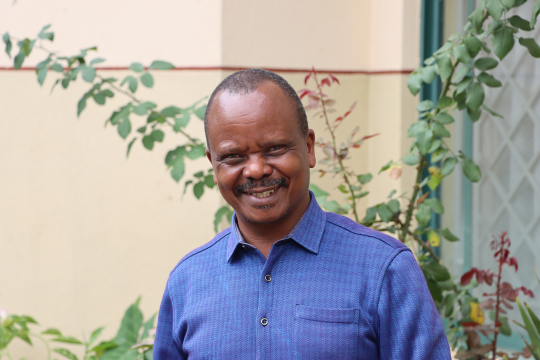Benson Mlambo Mwakina is the Director of Renewable Energy at the Ministry of Energy & Petroleum in Kenya. He also manages cross-cutting energy assignments in the country and the region and participates in the Inclusive Green Economy program. With a background as an electrical engineer, he can provide different perspectives on energy transition than other IGE Fellows, predominantly economists. Meet Benson Mlambo Mwakina, IGE Fellow, cohort of 2023/24!
What is your role in Kenya’s energy transition?
All sectors of our government are aiming for a green transition. You can say that our ministry is supporting all other sectors. We are an enabler. Depending on the energy sources we use, we are affecting everybody. If we don’t change the energy mix, all other sectors will suffer. Our ministry affects several SDGs, such as access to clean energy, poverty reduction, and health. So, an inclusive green transition must combine all those issues.
Tell me about your work at the ministry!
My role is to promote the use of renewable energy and reduce the use of dirty sources. Kenya is doing quite well on the global map, regarding electricity generation, with about 75% renewable. Geothermal is the leading source, followed by hydropower, wind, solar, and biomass. Our goal is that by 2030 it’s all renewable. That means we can take advantage of carbon credits.
I’m also the Chairman of the East African Centre of Excellence for Renewable Energy and Energy Efficiency (EACREEE), and the national representative in the International Solar Alliance, among others.
The Kenyan team’s Transition Initiative is about analyzing the barriers to the adoption of clean cooking solutions. How are things going in your country?
We’re moving forward. Kenya has a roadmap and we are working on a transition document stating that we shall not leave anyone behind. But there are of course many barriers. The biggest barrier is the availability of firewood. In Kenya, most of the land is privately owned. This forces individual owners to plant fast-growing trees (woodlots) for their own firewood while others compete for scarce resources in a few parcels of land set aside for communities. The result is that improved cookstoves that use less fuel are now more attractive.
Culture is also a very big issue.
Our goal is that by 2028 everyone shall have access to modern cooking, at least with LPG and biogas, but electric cooking can now be scaled up in the cities.
Last year, we arranged 300 demonstrations of biomass digesters in rural areas, to produce biogas.
What can the IGE program contribute to you in your daily work?
The program has really brought us together to share experiences from our five countries. The peer-learning is very important. There are some things that they do better in the other countries, for instance, the differentiated electricity tariffs that they have implemented in Uganda. And there are many experiences from Kenya that we have shared with the others since Kenya has come quite far with our transition compared to many countries in Africa. Rwanda for instance is implementing Result Based Financing, which we have many years of experience with and they can learn from our mistakes.
Do you have suggestions for improvements to the IGE program?
Ensure that the participants come from different sectors! Currently, there are mostly economists. When you work with a thematic area like we do in this program it’s good to have a mix.
